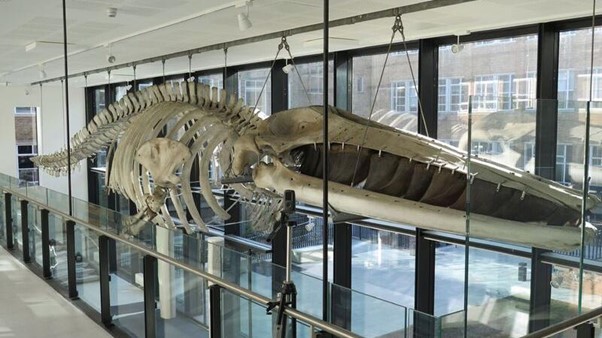
Whale Hall© Museum of Zoology, Cambridge University.
Cross-VESRI Convening
The 2024 Cross-VESRI (Virtual Earth System Research Institute) Convening, hosted by the Institute of Computing for Climate Science (ICCS) and supported by Schmidt Sciences, brought together 180 scientists from around the globe to Cambridge. Over four days in July, the event offered a rich program of science sessions, meetings, poster presentations, and social gatherings, all designed to inspire collaboration and forge new connections within the climate science community.
Eric Schmidt – co-founder with his wife Wendy of Schmidt Sciences – opened the event on Sunday in the spectacular Whale Hall at the Museum of Zoology. With a 21-meter-long fin whale suspended from the ceiling, delegates listened as he emphasized the critical role of collaboration in addressing global climate challenges. On Monday, each project belonging to or linked with VESRI had the opportunity to present their research (albeit briefly) to the participants. Colin Prentice (ICL) presented the talk for LEMONTREE to introduce our work on using Eco-Evolutionary Optimality theory to enhance our understanding of land ecosystems and their role in the Earth’s climate system.
Also on Monday, the PIs on the various VESRI projects, including LEMONTREE’s Sandy Harrison (Reading University) were invited to a one-on-one session with Balaji, the Climate Institute Lead at Schmidt Sciences, to reflect on the contribution VESRI has made to climate science as well as to discuss some of the wider issues facing climate scientists.
A key goal of the event was to identify research synergies with other VESRI projects. Of particular relevance to LEMONTREE is the new CALIPSO project, led by Philippe Ciais (LSCE), Pierre Friedlingstein (Exeter), and Corinne Le Quéré (UEA), offering important opportunities for collaboration.
Tuesday featured a keynote address by Prof. Pierre Gentine, one of the Principal Investigators of LEMONTREE. His talk, “Potential Futures for Computational Simulations,” explored emerging trends in climate modelling. Following the keynote, mixed VESRI group discussions focused on future directions and improvements for the enterprise.
The final day of the 2024 Cross-VESRI Convening featured a panel discussion on “The Future of Climate Modelling and Integration with VESRI Projects”. Moderated by Peter Cox (Exeter), the panel comprised Emily Shuckburgh (ICCS), Tapio Schneider (Caltech), Laura Zanna (NYU), and LEMONTREE’s Colin Prentice. The main focus of the discussion was the use of a ‘physics approach’ versus the emerging ‘AI approach’ to modelling. This discussion contrasted traditional methods of mathematically representing processes with newer, data-driven AI approaches. Contrasting views were expressed by different panel members and discussants, highlighting the fact that the research niche for AI in climate modelling is still not well established. Opinions on the future usefulness of AI in this field ranged from boosterish to somewhat sceptical. A point that arose several times was that a highly parameterized AI model might do an excellent job of prediction within the domain on which it was trained yet fail when subjected to “out-of-sample-climate” testing – which is a more stringent test than out-of-sampling testing using data for the modern climate.
Other members of the LEMONTREE team were also in attendance with Xu Liang (Pittsburgh University), Pier Luigi Vidale (Reading University), Joseph Ovwemuvwose (ICL) and Zinny Ezekannagha (Texas Tech University).
ICCS Summer School
Following on from the Convening, LEMONTREE’s Early Career Researchers (ECRs) Joseph Ovwemuvwose and Zinny Ezekannagha attended the annual ICCS summer school at the Department of Applied Mathematics and Theoretical Physics (DAMTP), University of Cambridge. This was the third annual summer school that ICCS has run, and it provides a great opportunity for engagement and learning for our early career researchers.
“The leaders and RSEs (Research Software Engineers) are some of the most supportive and approachable people I have ever worked with. They listen as if they don’t have anything else to do with their time and they are readily available to assist whenever necessary. The ICCS has become an important component of my professional skills development strategies”. Joseph Ovwemuvwose.
The sessions were tailored around the current and major computing techniques and technologies like Git and github, data visualization, machine learning and climate modelling. The training focused on some of the most important and popular programming languages such as Python, Fortran and Julia. The closing remark this year was delivered by Dr Evelina Gabasova which delved into the importance of creating useful digital resources and the necessity of balancing openness and profitability in making them available to users. We look forward to more of our ECR’s attending this event next year.


